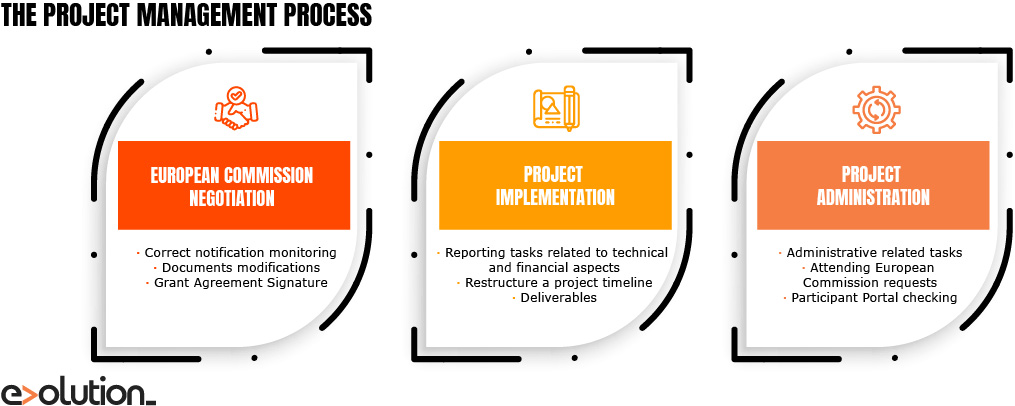H2020 Project Management Advisory Service

The correct development of Project Management activities increases the chances of obtaining support from Horizon 2020 to develop various R&D initiatives. For that reason, it is very important to find a suitable management process that could boost a project to achieve its overall goal.
Despite this process requiring a considerable amount of work and effort, the results are worth it, as it ensures that the project initiatives and overall objectives remain uncompromised.
To better understand the Project Management role regarding H2020, we should first recognize its relevance and necessary steps to assure our initiative can succeed. For that reason, we have asked our Project Management Coordinator, Jason Lakkiss, to tell us more about what he considers are the key aspects and phases of this role.
The Project Management process for H2020 funding programmes
After the evaluation of the proposal, the next step in the initiative’s lifecycle would be to immediately start working on Project Management tasks. To make this procedure easier, we have divided it into three mean aspects:
1. European Commission negotiation:
This negotiation process is a mandatory stage that starts once applicants are informed that their proposals are going to be funded by the European Commission. We aim to simplify this process as much as possible (typically over 90 days) through each of the necessary steps required to comply with the lengthy process right up until the final Grant Agreement signature.
At this level, it is crucial to be informed about the European Commission rules and procedures. To make this possible, the Project Manager should assure correct monitoring, as well as constant review and provide sound advice for excellent communication with this institution. On the other hand, this professional will modify necessary documents to coordinate technical and financial reviews and keep the Participant Portal updated.
Tasks under this process will be different in each case and often requires evidence that supports what the SME has submitted in their proposal previously and that such evidence does not suggest any misrepresentation and/or fraudulent activity (for example, proves that the SME is a Registered Entity and has no positive financial turnover before entering the market).
2. Project Implementation
In this second step, the applicant should be also guided by expert advice through the European Commission’s rules and regulations interpretation. There are reporting tasks related to technical and financial aspects that must be met and that comply with H2020 rules and regulations to avoid recovery of finances (for example, rejected costs due to ineligibility of expenses claimed that do not relate to the project action).
In that way, the Project Manager supports applicants with regards to how to write reports, draft amendments, and submit all relevant documentation online via the Participant Portal.
We often encourage to restructure a project timeline to accommodate any potential discourse as a result of any foreseen and or unforeseen deviations. This action will ensure proper implementation according to calendar and budget: submission of documents, financial justification, advice on communication activities, etc.
In this phase, we focus on the development and review of deliverables. These are outputs that must be produced by a predetermined date that coincides with the grant agreement during the action. Thus, a deliverable can be, for example, Open Research Development Pilot reports (ORDP), Periodic reports that discuss the technical progress made concerning work packages, milestones and key objectives etc. The correct submission of these items represents an essential step for the European Commission conditions.
3. Project Administration
Overall, there is a considerable amount of administrative related tasks involved in each of the processes listed above that the Project Manager has to either carry out failing that those same clients don’t wish to be coached on how to carry out these tasks independently.
Apart from deliverables, we should be ready to solve issues that may arise during the process: attend to any European Commission requests such as, making modifications to documentation, reports or amendments, etc.
On the other hand, Project Managers should continue checking the Participant Portal to guarantee proper material and reports submission, as well as, make additional changes if necessary.

What are the most important skills for an H2020 Project Manager?
In order to cluster essential abilities that give a good result to H2020 applicants, we have analysed our Project Managers job to better understand their expertise.
The role of a Project Manager can be quite demanding at times and unpredictable, as there is not a standard and or “regular day” working on projects for H2020 funding programmes.
The reason is that when these professionals are managing and monitoring a portfolio of clients, they are dealing with multiple queries and issues. For that reason, a good Project Manager should be flexible and use their expertise to suggest different possible solutions just for resolving one problematic issue. In any case, offered solutions are, of course, dependent on the client accepting and or taking our advice.
This capacity of Project Managers of keeping themselves versatile will be complemented with foresight skills, which will allow them to be good decision-makers. This is something important because some issues are yet to manifest but have been identified in advance.
These decisions should always be taken according to the project’s needs. In that way, Project Managers should be empathic and consider what could be better for the development of the R&D initiative, negotiating with clients if it is necessary to do so.
On the other hand, it is very important to always maintain effective communication with the H2020 applicants in order to inform them of all modifications or amendments requested by the European Commission. If solicitors are kept informed of the process, they could appreciate the Project Manager role and better understand the decisions taken.

Conclusions: Why is it important to have the professional advice of a Project Manager for our R&D initiative?
The correct application of the European Commission rules and considerations for the submission of R&D projects increases the chances of obtaining the greatest financial contribution amount from the European Commission.
As we have seen, these procedures can be confusing, stressful, and an extremely time-consuming burden placed on H2020 applicants. For that reason, it is advisable to hire specific management professionals to provide a service based on quality assurance that minimises the number of problems that would otherwise incur if applicants attempted to carry out the tasks independently with no support.
In that way, the Project Manager will study needs and funding options to ensure the initiative is managed, monitored and reported on sufficiently: adapting the project to the best possible result to succeed in its goals and funding aspirations.
At Evolution, the Project Management Department provides an on-demand service that seeks to advise clients with continuous support and quality assurance throughout their H2020 project lifecycle. Do you want to know more? Contact us at info@evolutioneurope.eu!
